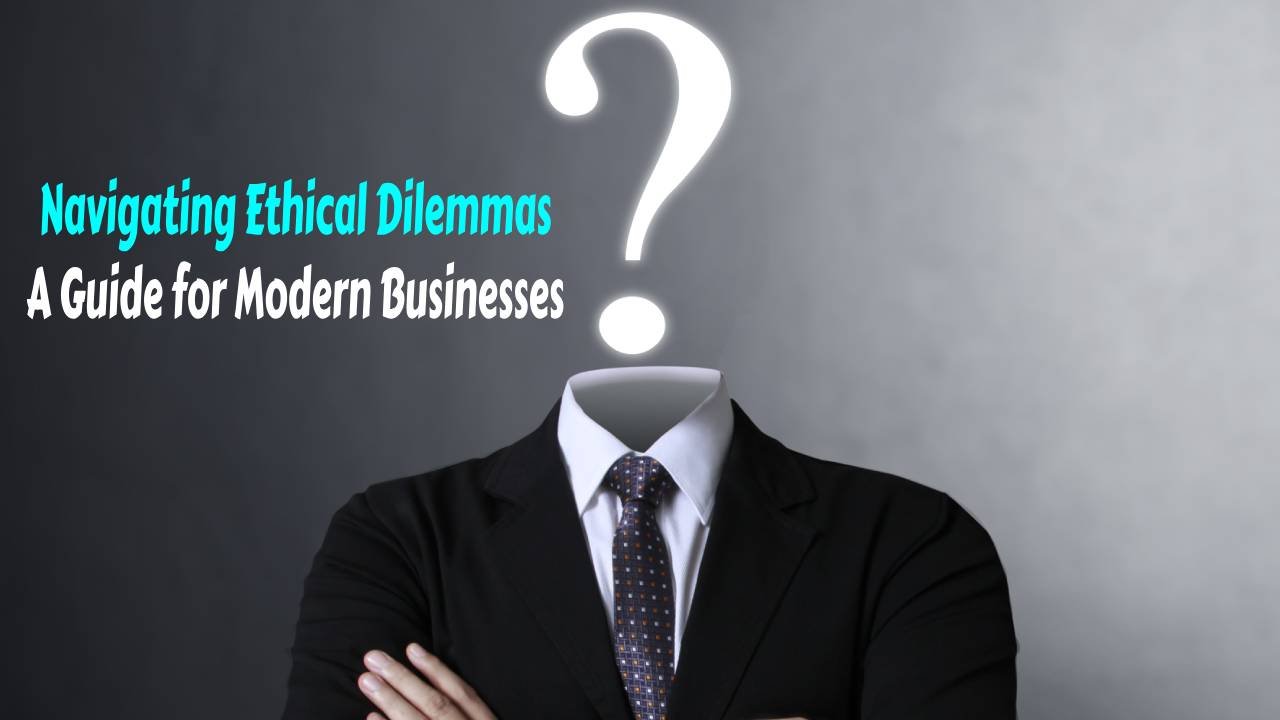Welcome to a journey of ethical exploration in the realm of business – a journey that equips modern businesses with the tools to deftly handle the challenges posed by ethical dilemmas.
In this guide, we will delve into the profound impact of ethical dilemmas on business landscapes, shedding light on the importance of grappling with these complex situations. An ethical dilemma is more than just a choice; it’s a crossroads where values, principles, and consequences intersect.
By understanding the significance of ethical dilemmas in business, we empower ourselves to make decisions that align not only with our goals but with our moral compass. So, join us as we navigate the intricate paths of ethical decision-making, unveiling the strategies that lead to both responsible business practices and lasting success.
- 1. The Nature of Ethical Dilemmas
- 2. The Power of Ethical Decision-Making
- 3. Factors Influencing Ethical Dilemmas
- 4. Navigating Ethical Dilemmas: A Step-by-Step Guide
- 5. Analyzing Options and Implications
- 6. Ethical Frameworks for Decision-Making
- 7. Implementing Ethical Decisions
- 8. Preventing Future Ethical Dilemmas
- 9. Case Studies: Real-World Examples
- 10. Ethical Leadership in Modern Businesses
- Conclusion
1. The Nature of Ethical Dilemmas
Ethical dilemmas might seem like a big grown-up phrase, but they’re just about facing tough choices. Imagine you have to decide between two good things or two bad things, and you don’t know which one is the best. Well, businesses have to make choices like that too, and they call them “ethical dilemmas”. Let’s learn more about what these are and the different kinds that modern businesses can come across.
Defining Ethical Dilemmas in a Business Context
Ethical dilemmas are like puzzles for the brain. They happen when a company has to pick between doing something good and doing something not-so-good. It’s like when you have to choose between eating a yummy treat and sharing it with your friend – that’s a little dilemma.
But in business, these dilemmas are more complex. They happen when a company needs to think about what’s right for them and what’s right for everyone else. It’s not always easy to figure out what’s the best thing to do.
Types of Ethical Dilemmas Modern Businesses Face
Imagine you’re playing a game and you have to choose between two really fun options – that’s like what businesses face, but their choices can have big consequences. Sometimes, businesses have to think about telling the truth even when it’s hard. Other times, they need to decide if they should treat people fairly, even if it means they might not make as much money.
And then, there are moments when businesses need to decide how to use information about people in the right way. These are just some of the ethical dilemmas that businesses deal with. It’s kind of like being at a crossroads and trying to pick the path that’s good for everyone, even if it’s not the easiest one.
2. The Power of Ethical Decision-Making
Have you ever heard the saying, “Choices have superpowers”? Well, that’s what this part is all about – how choices, especially the good ones, can make a big difference for businesses. Imagine you’re a superhero, and your special power is making decisions that are fair and kind. Just like superheroes, businesses have their special power called “ethical decision-making”. Let’s dive into how these powerful choices can change the world of business.
The Far-Reaching Impact of Ethical Choices on Businesses
Imagine you have a magic wand that can make things better or worse with a wave. Well, businesses don’t have magic wands, but they do have choices that can make things better or worse for everyone around them. When businesses make ethical choices – the ones that are fair, honest, and respectful – it’s like they’re using their kind of magic to create positive ripples.
These ripples spread far and wide, touching customers, employees, and even the environment. Just like a pebble dropped in a pond creates ripples, ethical choices in business create waves of goodness that can travel across the world.
Building Trust and Reputation Through Ethical Behavior
Imagine you have a trusty friend who always keeps their promises and helps you when you need it. You trust them, right? Well, businesses can be like that trusty friend when they make ethical choices. When a business keeps its promises and does what’s right, people start to trust it. Trust is like a golden key that opens doors to great things.
It brings loyal customers who believe in the business, and it builds a shiny reputation that makes people want to work with and for the business. Ethical behavior is like the glue that holds trust and reputation together – it’s what makes the business shine bright in the eyes of the world.
3. Factors Influencing Ethical Dilemmas
Have you ever wondered why people from different places do things differently? Just like how your family might have its own rules, communities, and businesses have their own rules too.
These rules, called “ethics”, help us decide what’s right and what’s not so right. But here’s the thing: these rules can change based on where we are and what’s happening around us. That’s what we’re going to explore in this part – how different things like where we live and how we use technology can affect the choices businesses make.
So, just like how we think about our actions before doing something, businesses need to think about how their choices match the rules of the puzzle they’re in and how their technology choices can help and sometimes challenge those rules. This way, they can make sure they’re doing what’s right, no matter where they are in the world.
Cultural and Societal Factors Shaping Business Ethics
Imagine you’re in a big puzzle, and each puzzle piece represents a different culture or community. Each piece is unique, with its colors and shapes. Just like these puzzle pieces, different cultures and societies have their ideas about what’s good and what’s not so good. This can be like having different playbooks for the game of life.
When businesses play by these different rules, they’re making ethical choices that fit the puzzle they’re in. For example, what’s okay to do in one place might not be okay in another. So, businesses need to think about the people and places around them to make sure their choices match the puzzle piece they’re on.
Technological Advancements and Their Ethical Implications
Have you ever seen a robot that can talk and think like a person? Or a computer that can remember things better than you? These are some of the cool things that technology can do. But just like how we make choices, technology can make choices too. Sometimes these choices are about privacy – like when you decide who can see your drawings or photos.
In business, technology can help make things faster and easier, but it can also bring challenges. Imagine a business that collects lots of data about you. They need to decide how to use it safely and fairly. This is where technology and ethics come together. Businesses need to think about how their technology choices can affect people and the world.
4. Navigating Ethical Dilemmas: A Step-by-Step Guide
Imagine you’re in a forest, and you have to find your way using a map and a compass. Navigating through ethical dilemmas is a bit like that – it’s about finding the right path when you’re faced with tough choices.
Just like using tools to guide you through the forest, businesses have tools too. This part is all about those tools – the steps that help businesses make choices that are good and fair. So, let’s learn how to navigate through the twists and turns of ethical dilemmas.
Recognizing Ethical Dilemmas Early On
Imagine you’re playing a game, and you see a tricky puzzle. You know you need to solve it, but first, you have to recognize that it’s a puzzle. In the world of business, ethical dilemmas can sometimes look like regular decisions.
They might wear clever disguises, so it’s important to spot them early. Maybe it’s a choice that makes you feel like something isn’t quite right, or it’s a decision that could affect people in different ways. When businesses learn to see these signs, it’s like putting on special glasses that help them see the puzzle pieces hidden in plain sight.
Gathering Relevant Information and Stakeholder Perspectives
Imagine you’re making a cake, and you need to know what flavors your friends like before you start baking. That way, you can make a cake that makes everyone happy.
In business, when faced with an ethical dilemma, it’s important to gather information and listen to the people who might be affected by the choice. These people are called stakeholders – they’re like friends who will enjoy the cake.
By asking questions and learning about their thoughts, businesses can make choices that take everyone’s feelings and needs into account. It’s like mixing all the right ingredients to create a cake that everyone will love.
5. Analyzing Options and Implications
Imagine you’re at a crossroads, and you have to decide which path to take. Each path leads to a different adventure, and you want to choose the one that will make things better. In the world of ethical dilemmas, businesses face a similar choice – they have to figure out which path to take when making tough decisions.
This part is all about exploring those paths and thinking about what might happen next. It’s like having a treasure map that helps you choose the best route.
Just like picking a path on a treasure map, these steps – weighing pros and cons and thinking about consequences – help businesses make the best choices when they’re faced with tricky decisions. So, let’s put on our explorer hats and journey through these steps together.
Weighing the Pros and Cons of Different Courses of Action
Imagine you’re trying to decide whether to eat a big ice cream cone or a plate of tasty cookies. You’d want to think about which one will make you happier and feel better afterward, right? Well, businesses do the same thing when they’re in an ethical dilemma.
They look at all the choices they have and think about the good things (pros) and the not-so-good things (cons) that could happen with each choice. It’s like making a list of all the exciting things about the ice cream and all the yummy things about the cookies. By doing this, businesses can see which choice has more pros and fewer cons, helping them pick the option that’s kindest to everyone.
Identifying Potential Consequences for Various Stakeholders
Imagine you’re playing a game where your moves affect your teammates and opponents. You’d want to think about how your moves will make everyone feel, right? In the business world, the choices businesses make can affect lots of people – these people are called stakeholders.
There are customers, employees, the environment, and more. Just like in a game, businesses need to think about how their choices might make these stakeholders feel. Will the choice make everyone happy, or will it make some people upset? By thinking about this, businesses can make choices that create more smiles and fewer frowns.
6. Ethical Frameworks for Decision-Making
Imagine you’re in a magical land where you have a guidebook to help you make choices – a book that helps you decide if something is good or not-so-good. Well, in the world of ethical dilemmas, businesses have something like that too. They have “ethical frameworks”, which are like guidebooks that give them different ways to think about what’s right and what’s not.
These frameworks are like different paths that help businesses find their way through tough decisions. Let’s take a journey through these paths and learn how they work.
So, just like using a guidebook in a magical land, businesses use these ethical frameworks to help them make choices that are good and fair. Let’s explore each framework and see how they help businesses find their way through ethical dilemmas.
Utilitarianism: Maximizing the Greater Good
Imagine you have a magical wand that can make lots of people happy all at once. Utilitarianism is kind of like that wand. It’s a way of thinking that says, “Let’s pick the choice that brings the most happiness to the most people”. Just like sharing your toys with your friends can make everyone smile, businesses using utilitarianism try to make choices that bring the biggest smiles to the most faces. It’s like adding up all the happiness and making sure there’s more of it than anything else.
Deontology: Following Moral Rules and Principles
Imagine you have a set of rules that you follow no matter what – rules like always telling the truth and being kind. Well, businesses have their own set of rules too, and it’s called deontology. Deontology says, “Let’s follow these rules because they’re what’s right, even if the result isn’t always the happiest”. It’s like playing a game where you stick to the rules, no matter what, because you know it’s the right thing to do. Businesses that use deontology believe that there are certain things you should never do, no matter what the outcome might be.
Virtue Ethics: Emphasizing Personal and Organizational Values
Imagine you have a special treasure map that guides you to be a kind and brave adventurer. Virtue ethics is a bit like that map. It’s a way of thinking that focuses on being a good person with strong values. Just like how you want to be kind and honest, businesses using virtue ethics want to be good too. They think about their values and the values of the company, and they make choices that match those values. It’s like being a superhero with a special code of honor.
7. Implementing Ethical Decisions
Picture a time when you’ve built a wonderful sandcastle on the beach. Now imagine it’s time to make sure your sandcastle stays strong and safe. Just like that, in the world of business, making a choice is just the start – it’s important to make sure that choice becomes real and strong.
This part is all about how businesses take their ethical decisions and turn them into actions that make a difference. It’s like building a sandcastle that stands tall and protects everyone around it.
Just like keeping your sandcastle strong against the waves, businesses take their ethical choices seriously and work hard to make sure they become real actions. Let’s explore these steps – communicating with stakeholders and facing resistance – to see how businesses turn their choices into positive changes.
Communicating Transparently with Stakeholders
Imagine you’re planning a big adventure, and you want to make sure everyone knows where you’re going and what you’ll do. That’s what businesses need to do too when they make ethical decisions. They need to tell their friends, or stakeholders, about the choices they’ve made and why.
This helps everyone understand what’s happening and why it’s important. Just like when you explain your game rules to your friends, businesses need to be open and clear so that everyone knows what’s going on.
Overcoming Resistance and Navigating Pushback
Imagine you’re trying to teach a new game to your friends, but some of them aren’t sure they want to play. Sometimes, businesses face something similar when they want to turn their ethical choices into actions. Some people might not agree with the choice, and they might push back or resist the change. It’s like trying to convince your friends that the new game is really fun.
Businesses need to find ways to talk to these people, listen to their thoughts, and show them why the choice is a good one. It’s about working together to make sure everyone is on the same page.
8. Preventing Future Ethical Dilemmas
Imagine you have a magic shield that can protect you from troubles and help you make good choices. Well, businesses can have something like that too – it’s called an “ethical shield”. This shield helps them avoid tricky situations and make choices that are kind and fair.
In this part, we’ll learn how businesses can use their ethical shield to prevent problems from happening in the first place. It’s like making sure you have all the right tools before you head out on an adventure.
Just like having a magic shield or a trusty journal, businesses can use an ethical shield and regular training to keep problems away and make sure they’re always on the path of doing what’s good and fair. Let’s dive into these steps – developing an ethical culture and training with reflection – to see how businesses create a strong shield against future ethical dilemmas.
Developing an Ethical Culture Within the Organization
Imagine you’re part of a team where everyone believes in being kind and fair. That team would feel like a family where everyone helps each other and makes good choices.
In businesses, creating an ethical culture is a bit like that. It’s about making sure that everyone in the company knows and believes in doing what’s right. When everyone shares the same values, it’s easier to make choices that keep problems away. Just like how friends help each other follow the rules of a game, businesses with an ethical culture help each other do what’s right.
Regular Ethical Training and Reflection
Imagine you have a special journal where you write about your adventures and what you learned. Well, businesses can do something similar by having regular training and thinking sessions. This helps them learn more about making ethical choices and how to avoid dilemmas. It’s like practicing your skills before you play a game.
Businesses also take time to look back at the choices they made and think about what went well and what they could do better next time. It’s like looking at a treasure map and finding new paths to explore.
9. Case Studies: Real-World Examples
Imagine you’re reading stories about brave explorers who face challenges and find clever solutions. Well, businesses have their own stories too – real-life adventures where they face ethical dilemmas and make choices that affect many people. In this part, we’ll dive into two exciting case studies that show how companies deal with tough decisions. It’s like reading about heroes who use their superpowers to make the world a better place.
Just like reading about brave explorers who face challenges, these case studies show us how businesses tackle ethical dilemmas and make choices that matter. Let’s dive into the stories of Company A and Company B to see how they use their superpowers to solve real-world problems.
Company A: Balancing Profitability and Environmental Responsibility
Imagine a company that makes toys loved by kids all around the world. They want to make lots of toys because it makes them lots of money. But, they know that making too many toys can hurt the planet. This is an ethical dilemma – a tricky choice between making money and protecting the Earth.
How can the company find a balance between being profitable and being kind to nature? This case study will take us through their adventure as they navigate this dilemma and find a solution that’s good for everyone.
Company B: Addressing Employee Privacy in the Age of Data Analytics
Imagine a company that uses computers to collect lots of information about its employees. This information helps the company know how to make things better for everyone. But, some employees worry that their privacy might be at risk – it’s like wondering if someone is peeking at your diary. This is another ethical dilemma – a choice between using data to improve things and respecting the privacy of employees.
How can the company use data responsibly while keeping its employees’ trust? This case study will take us on a journey to discover how they handle this challenge and find a way to protect both data and privacy.
10. Ethical Leadership in Modern Businesses
Imagine you’re in a team where your captain guides everyone to play fairly and with respect. Well, in the world of business, leaders are like captains who set the tone for how everyone behaves. Ethical leadership is about being a good role model and inspiring others to make choices that are kind and fair.
In this part, we’ll explore how leaders play a big role in shaping how businesses make decisions and create a positive environment. It’s like having a hero who shows the way and makes sure everyone follows the rules.
Just like how a captain guides a team to play well, leaders in businesses guide their teams to make choices that are kind, honest, and fair. Let’s explore these steps – the role of leadership and inspiring behavior – to see how leaders help create an ethical superhero team in modern businesses.
The Role of Leadership in Setting Ethical Tone
Imagine you’re playing a game, and the rules are, to be honest, fair, and respectful. The leader, like the captain of a team, makes sure everyone follows these rules. In business, leaders have a similar job – they set the tone for how the whole team behaves.
If leaders make choices that are kind and fair, others will follow their example. This helps create a culture where everyone knows what’s right and works together to do what’s good. Leaders are like beacons that light up the path of ethical decision-making.
Inspiring Ethical Behavior Among Employees
Imagine you’re at a party, and a friend starts dancing. Soon, others join in because it looks like fun. Well, leaders in businesses inspire ethical behavior similarly. When leaders make choices that show honesty and fairness, employees feel inspired to do the same. It’s like a chain reaction – one good choice leads to another.
Leaders also talk to employees about why ethical choices are important. This helps everyone understand why it’s like following the rules of a game – it makes the whole experience better for everyone.
Conclusion
In the world of business, facing ethical dilemmas is a bit like being on an exciting adventure. We’ve journeyed through this guide to understand the power of ethical decision-making and how it shapes the path modern businesses take.
Remember, making ethical choices is not a one-time thing – it’s a continuous journey, like playing a game where each move counts. As we’ve seen, leaders, employees, and stakeholders all play a role in making sure businesses choose what’s right, even when it’s not the easiest path. Together, we can shape a future where businesses make choices that are kind, fair, and responsible.
So, whether you’re a business leader, an employee, or just someone who cares about the world, remember that the choices you make matter. Let’s keep the conversation going – share your thoughts and feedback in the comments below, and don’t forget to share this amazing information with your friends. By working together, we can create a world where ethical dilemmas are met with courage, and our collective efforts shape a brighter future for us all.






